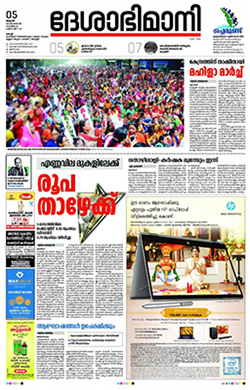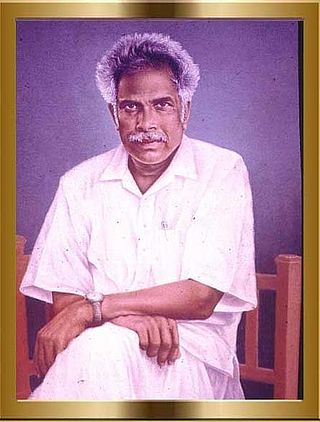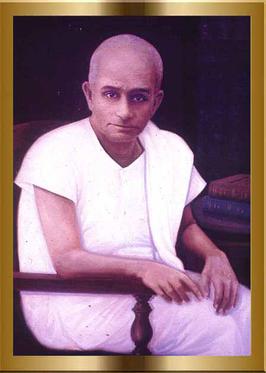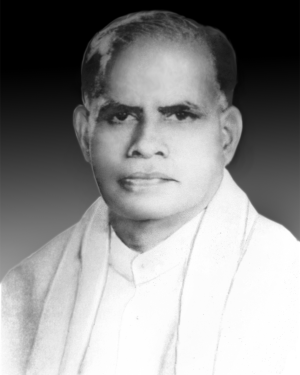
Elamkulam Manakkal Sankaran Namboodiripad, popularly known as EMS, was an Indian communist politician and theorist, who served as the first Chief Minister of Kerala in 1957–1959 and then again in 1967–1969. As a member of the Communist Party of India (CPI), he became the first non-Congress Chief Minister in the Indian republic. In 1964, he led a faction of the CPI that broke away to form the Communist Party of India (Marxist).

The Communist Party of India (CPI) is the oldest communist party in India and one of the eight national parties in the country. The CPI was founded in modern-day Kanpur on 26 December 1925.

Ottapalam, is a town, taluk and municipality in the Palakkad District, Kerala, India. It is the administrative headquarters of the Ottapalam taluk. Ottapalam is located about 36 km from district headquarters Palakkad. Ottapalam is located along the banks of Bharathapuzha, second longest river of the state.
Malayalam journalism encompasses journalism published and broadcast in the Malayalam language. Modern Malayalam journalism can be traced to the publication of the Raajyasamaachaaram and the Pashchimodhayam under the direction of Hermann Gundert in June 1847. Kerala has the highest media exposure in India with newspapers publishing in nine languages, mainly English and Malayalam.
Kerala Socialist Party (KSP) is a political party in India founded under the leadership of Mathai Manjooran on 21 September 1947 at Kozhikode. It began as a small party, but its front-line leaders compelled the party deep into the public imagination. The party became part of the coalition that formed the first democratically elected communist government in the world after San Marino.

Deshabhimani is a Malayalam newspaper and the organ of the Kerala State Committee of the Communist Party of India (Marxist). It started as a weekly in Calicut on 6 September 1942 and converted to a daily in 1946. The paper now has ten different printing centres: Calicut, Cochin, Trivandrum, Kannur, Kottayam, Trichur, Palakkad, Alappuzha, Kollam and Malappuram. At present, Puthalath Dinesan State Secretariat Member of the CPI(M) is the Chief Editor of the paper, K.J. Thomas, CPI(M), secretariat member of the CPI(M), the General Manager and V. B Parameshwaran, the Resident Editor.

Chengalath Kunhirama Menon (1857–1935) was the founder/editor of Kerala Pathrika—first and earliest Malayalam newspaper published from Kozhikode, Calicut Kerala during 1885. Menon is often referred to as Chengalathu Valiya Kunhirama Menon; the appellation Valia is used to distinguish him from his nephew and well-known story writer Chengalathu Cheriya Kunhirama Menon popularly known with reversed initials M. R. K. C.

K. Damodaran was an Indian Marxist theoretician and writer and one of the leader of the Communist Party of India in Kerala, India.

Alappat Sreedhara Menon, known as A. Sreedhara Menon, was an Indian historian from Kerala. He is best known as the State Editor (1958–68) of Kerala District Gazetteers (1961–1975). He served as registrar of the Kerala University from 1968 to 1977, before retiring in 1980.
N.E. Balaram was one of the founding leaders of the communist movement in Kerala, India. A Marxist ideologue, scholar in Indian Philosophy and a well known literary critic in Malayalam, he wrote on the history of the communist movement in Kerala, which is considered as the most authentic record of the early period. He also authored several works in history, philosophy, politics, and literature.

Communism in Kerala refers to the strong presence of communist ideas in the Indian state of Kerala. In addition to Kerala, the Indian states of West Bengal and Tripura have had multiple democratically elected Marxist governments, and change takes place in the government by regular multiparty electoral processes. The communism of Kerala has provided Indian communist stalwarts such as M. N. Govindan Nair, C. Achutha Menon, K. Damodaran, T. V. Thomas, N. E. Balaram, E. M. S. Namboodiripad, A. K. Gopalan, K. R. Gouri Amma, P. K. Vasudevan Nair and C. K. Chandrappan.

Cherukad Govinda Pisharodi, commonly known as Cherukad, was a Malayalam-language playwright, novelist, poet and political activist, associated with the Communist movement in Kerala state, India.
Elamkulam Manakkal Sankaran Namboodiripad, popularly known as EMS, was an Indian communist politician and theorist, who served as the first Chief Minister of Kerala state in 1957–59 and then again in 1967–69. As a member of the Communist Party of India (CPI), he became the first non-Indian National Congress chief minister in the Indian republic. In 1964, he led a faction of the CPI that broke away to form the Communist Party of India (Marxist).

Nalapat Narayana Menon was a Malayalam language author from Kerala state, South India. His oeuvre consists of poems, plays and translations. His best known works include Paavangal, a translation of Victor Hugo's Les Misérables, and the elegy Kannuneerthulli.
K.A.Keraleeyan (1910–1994) was one of the founder-leaders of the Communist Party of India in Kerala. He was born on April 15, 1910 in Chirakkal taluk in Kannur district.

Malappurath Raman Chandrasekharan, popularly known as M.R. Chandrasekharan or simply M. R. C., is a Malayalam literary critic and author from Kerala, India. Chandrasekharan has published more than 50 books in different literary sections like literary criticism, translations, politics, social etc. He also works in the field of journalism and education. He won the 2010 Kerala Sahitya Akademi Award for Literary Criticism.

Kannur, formerly known in English as Cannanore, Arabic as Kannanur, and Portuguese as Cananor, is a city and a Municipal Corporation in North Malabar region, state of Kerala, India. It is the largest city in North Malabar, which is the northernmost region of Kerala. It is sometimes identified Kolathunadu, which was ruled by the Kolathiris. In the 12th and 13th centuries there was trade with Persia and Arabia.

K. A. Damodara Menon (1906-1980) was an Indian National Congress politician, minister, journalist, writer, freedom fighter and an activist in the movement for united Kerala. He was elected to the Provincial Parliament in 1950 and Indian Parliament from Kozhikode as a representative of Kisan Mazdoor Praja Party, in 1952. During his term as a member of Kerala Legislative Assembly, he served as the Minister for Industries and Local Administration.

Aikya Kerala Movement, the movement to establish a united Kerala was one of the political movements in present-day Kerala state of India. The term Aikya Kerala literally means 'United Kerala'. It has been a statewide peaceful movement for a united Kerala state for all Malayalam speaking people, which lasted for more than three decades. Following the movement, The Malayalam-speaking regions of the Travancore–Cochin merged with the Malabar District and the Kasaragod Taluk of South Canara district in Madras State to form the modern Kerala state on 1 November 1956, according to the States Reorganisation Act, 1956 passed by the Government of India.
Communists were actively involved in Indian independence movement through multiple series of protests, strikes and other activities. It was a part of revolutionary movement for Indian independence. Their main thrust was on organising peasants and working classes across India against the British and Indian capitalists and landlords.














